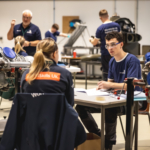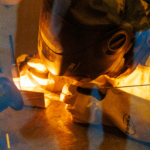The usual training programme for the Manufacturing Team Challenge (MTC) Squad members concentrates in the first instance on the individual skills of electronics, machining and welding/fabrication. This is aimed at the surprise elements that will come during the competition. Alongside this, each team designs a product to meet the brief or draft brief as soon as they are available. CAD (computer-aided design) naturally comes along with this, which leads nicely onto the additive manufacturing element.
Learning during lockdown
Lockdown, and in turn remote training has brought about changes to this. Equipment access has been the chief problem. Using a shared cloud drive courtesy of Google and Google Classroom facilities has always been a mainstay for training, but has become the paramount facility.
MasterCam and Matrix (Flowcode) have given software licences to help us continue training, Autodesk software has become invaluable as we are able to work on designs remotely, sharing ideas and drawings via the Google Classroom and drive.
Panopto software has been used to build video content for the team to copy, follow and review to help them train on software and some videos have been published on Youtube to help out teams in the future at WorldSkills UK LIVE. Of course, the Squad training videos have been kept to just us as they contain some confidential information!
Google Hangouts has also allowed us to hold face-to-face meetings, discuss who can train in what skills with equipment at home and who is going to develop what parts of the product.
Putting their skills to good use
Covid 19 has changed things for us, but really it has mostly changed the method of training delivery and the training order. The most pleasing thing it has done is made the Squad very keen to train in additive manufacturing. We have added extra 3D printers to our training equipment and sent them out to the Squad members.
They are combining training in the use of Inventor software and 3D printing in both PLA and PETG materials with making visor bands and clips for the NHS. Following the approved procedures is an absolute must to protect NHS workers and is such good training for the Manufacturing Team Challenge Squad in why developing procedures, and following them once they are right, is critical.
The perks of problem-solving
Teams in some countries do not develop the product, but I believe their involvement in this is crucial. This cycle I am far more involved in bringing the Squad members to best practice design methodologies. This should give the best of both practices, improving the product and build time, but still driving learning. Solving problems, knowing the design and having investment in the product are key when problems occur, as they always do. It is the problem-solving that drives the higher-level learning and increases skills.
The hard part of this when working remotely is identifying the problems by testing systems and people to find them. Though remote working will bring problems that each Squad member will have to solve on their own and this in turn should increase their performance, confidence and self-reliance. Signs of this can already be seen with emails asking questions followed by emails saying, “it’s okay, I have figured it out.”
Perhaps the situation will change the way I do things forever as there are clear advantages for well-motivated self-starters like our Squad members!
Lastly, a big thank you to companies out there supplying free resources, it is a massive help and very appreciated.


